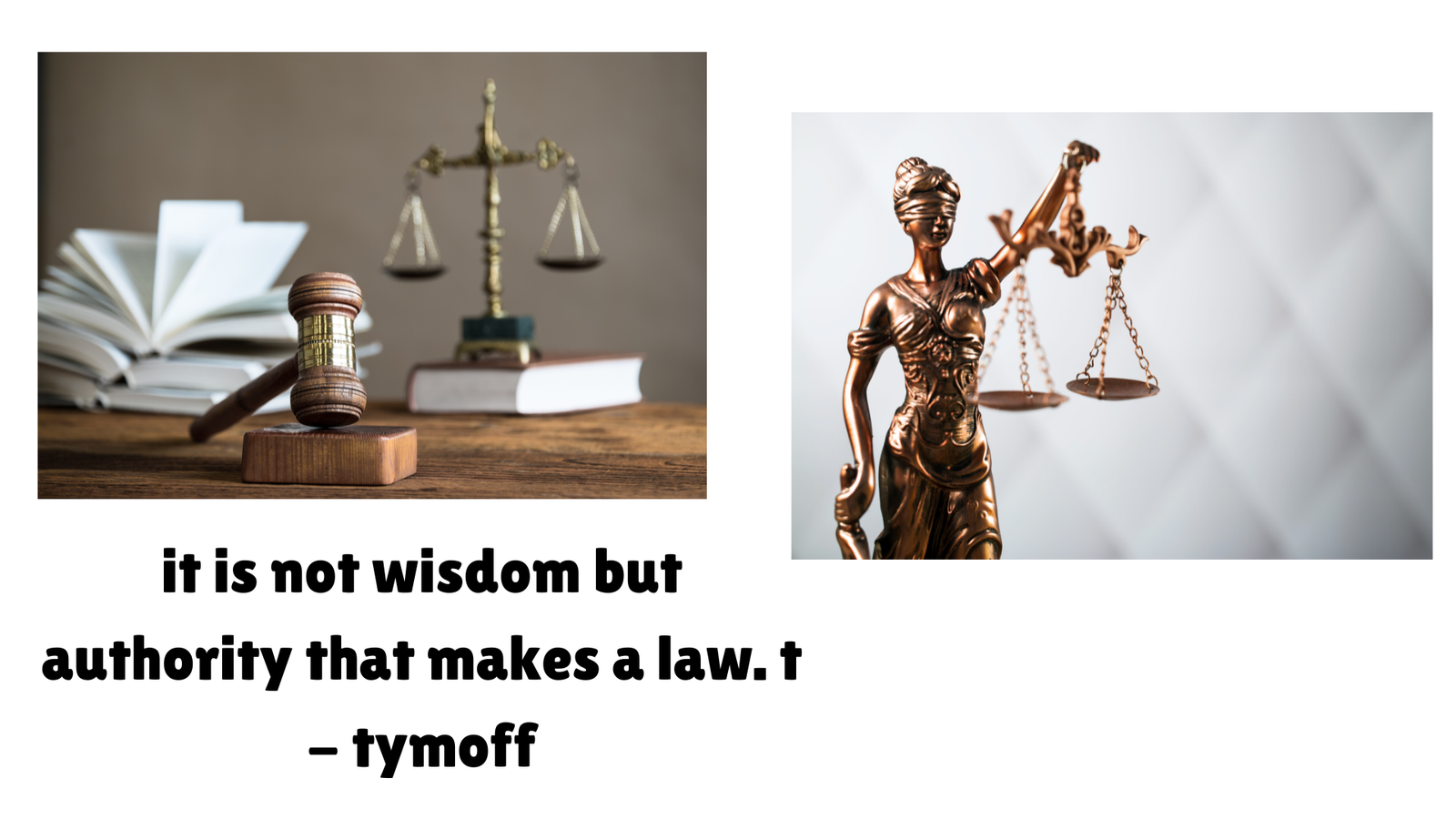Laws have been an integral part of human civilization, guiding societies to function harmoniously while maintaining order and justice. However, the philosophical question of what truly defines a law often arises: is it the wisdom embedded within the law or the authority that enforces it? The quote, “It is not wisdom but authority that makes a law,” attributed to Tymoff, encapsulates the essence of this debate. This article explores the interplay between wisdom and authority in the formation and enforcement of laws, their implications for society, and the challenges they pose to modern governance
The Essence of Authority in Lawmaking
Authority plays a pivotal role in the establishment of laws. It provides the legitimacy and power required to enact and enforce rules within a society. Without authority, even the wisest of laws would remain mere suggestions or ideals, incapable of influencing human behavior on a large scale. Governments, judicial systems, and legislative bodies derive their authority from the constitution, the social contract, or other frameworks that grant them the power to govern.
Historically, the authority to make laws has often been centralized, vested in monarchs, dictators, or governing bodies. This centralization ensured compliance, as disobedience to laws was met with penalties enforced by the same authority that created them. In this context, wisdom took a secondary role, as the primary concern was maintaining order and control. While wisdom can inform the content of a law, it is the authority that guarantees its implementation and adherence.
The Limitations of Wisdom in Lawmaking
Wisdom, characterized by experience, knowledge, and insight, is undeniably valuable in crafting laws. A wise law is one that considers the needs of the people, anticipates potential outcomes, and strives for fairness and justice. However, wisdom alone cannot transform a law into an enforceable standard. Without authority, even the most well-thought-out laws lack the mechanism to compel adherence.
Consider historical instances where philosophical ideals failed to gain traction due to a lack of authoritative backing. The concept of human rights, for example, existed long before it became enshrined in legal frameworks. It was only when governing bodies, such as the United Nations, adopted these rights and established mechanisms for enforcement that they gained widespread acceptance and implementation. This illustrates that wisdom, while foundational, requires authority to effect change.
Authority Without Wisdom: A Double-Edged Sword
While authority is necessary for the establishment and enforcement of laws, it can become dangerous when divorced from wisdom. Laws enacted without consideration of their consequences or the needs of the populace can lead to injustice, oppression, and social unrest. Authoritarian regimes throughout history have demonstrated the perils of laws driven solely by power without regard for wisdom or fairness.
For instance, during colonial rule, laws were often imposed by foreign powers with little understanding or concern for local customs, cultures, or needs. These laws, enforced through sheer authority, led to widespread resentment and resistance. Similarly, laws rooted in authoritarianism can suppress dissent, curtail freedoms, and perpetuate inequality, highlighting the need for a balance between wisdom and authority in lawmaking.
The Dynamic Balance Between Wisdom and Authority
The relationship between wisdom and authority in the context of lawmaking is not a binary one but a dynamic interplay. A just and effective legal system relies on the fusion of both elements. Wisdom ensures that laws are fair, equitable, and in alignment with societal values, while authority provides the means to implement and uphold these laws.
Modern democratic systems strive to achieve this balance by incorporating mechanisms such as checks and balances, public participation, and judicial review. Legislative bodies are tasked with creating laws based on collective wisdom, drawing from expert opinions, public consultations, and empirical evidence. At the same time, executive branches and law enforcement agencies wield the authority to implement these laws, ensuring compliance and order.
The judiciary serves as an intermediary, interpreting laws and ensuring that authority is exercised within the bounds of wisdom and fairness. This tripartite system exemplifies how wisdom and authority can coexist to create a robust and just legal framework.
Challenges to Achieving the Balance
Despite the efforts to harmonize wisdom and authority, challenges persist in modern governance. Corruption, political biases, and vested interests can undermine the role of wisdom in lawmaking, leading to laws that serve the interests of a few rather than the greater good. Similarly, the misuse of authority can result in overreach, where laws are enforced arbitrarily or disproportionately.
Technological advancements and globalization have added new dimensions to these challenges. The rapid pace of change often outpaces the ability of legal systems to adapt, leading to outdated or inadequate laws. For example, issues such as data privacy, artificial intelligence, and climate change require new legal frameworks that balance innovation with regulation. Achieving this balance necessitates a nuanced approach that combines wisdom with authoritative action.
The Role of Public Participation in Lawmaking
Public participation is a critical component in bridging the gap between wisdom and authority. By involving citizens in the legislative process, governments can ensure that laws reflect the diverse perspectives and needs of the populace. Mechanisms such as public consultations, referendums, and grassroots movements empower individuals to contribute their insights, thereby enriching the wisdom that informs lawmaking.
In democratic societies, the electoral process serves as a means for citizens to hold authorities accountable, ensuring that those in power act in the best interests of the people. This participatory approach not only enhances the legitimacy of laws but also fosters a sense of ownership and responsibility among citizens, encouraging voluntary compliance.
Conclusion: Striking the Right Balance
The statement, “It is not wisdom but authority that makes a law,” emphasizes the indispensable role of authority in the establishment and enforcement of laws. However, this should not diminish the importance of wisdom in crafting just and effective legal frameworks. The interplay between wisdom and authority is crucial for the development of laws that are not only enforceable but also equitable and reflective of societal values.
Modern governance must strive to achieve this balance by fostering transparency, accountability, and public participation in the legislative process. By doing so, societies can ensure that authority is exercised responsibly and that laws serve the collective good, rather than the interests of a select few.
In an ever-evolving world, the challenge lies in adapting legal systems to address emerging issues while maintaining the delicate equilibrium between wisdom and authority. Only by embracing both elements can humanity build a foundation of laws that promote justice, equality, and progress for all.



